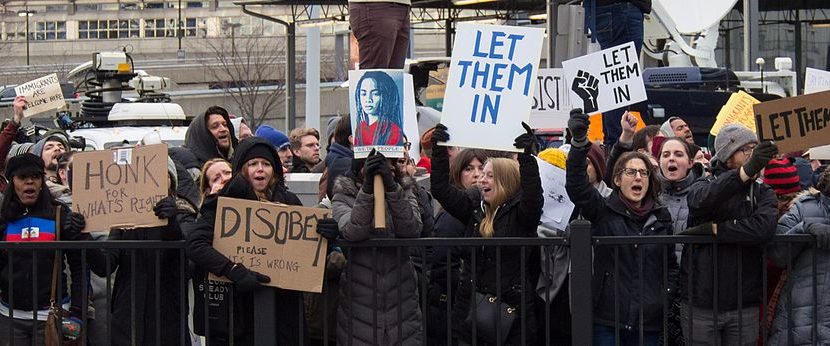An International Reaction to Donald Trump’s Immigrant Ban
“In a real sense all life is interrelated. All men are caught in an inescapable network of mutuality, tied in a single garment of destiny. Whatever affects one directly, affects all indirectly.”
– Martin Luther King Jr. Letter from a Birmingham Jail

The president of the United States should be someone…well-trained in public matters and issues…well-equipped with broad insight. I worry about Trump…he has not studied much on other regions’ contextual issues. —graduate student from Seoul, Korea
Trump’s opinions on racial, economic, and international issues are too aggressive and hate-oriented. What caused the most harm is not the content of these opinions, which are already bad enough themselves, but the public reception of them. Many people who have been unsatisfied with a multicultural society feel as if they are getting a green light in expressing themselves… bullying has doubled within a week after his presidency… people do not feel safe. —student from Taiwan
My concern is how he is going to deal with Muslims, because he mentioned us many times in his campaigns…I hope that he is looking for peace and not to have wars. —student from Al Khobar, Saudi Arabia
As a Kuwaiti that studies from in the U.S., I’m freaking out…I feel as if I’m unwanted in the place I (now live). —student from Kuwait City, Kuwait
He will benefit both us and America more (economically), but my only concern is that maybe people here will treat me differently because of my head scarf and they will be able to show their racism more freely…(still…) I hope that Trump surprises us in a good way! Maybe he is a good guy. —student from Riyadh, Saudi Arabia
My biggest concern is that the non-white minorities will be insulted a lot and that might leave shadows in their minds. —graduate student from China
My concern is about gun control. What Trump advocates is risky. As a student, especially an international student, I am scared about robbery. Every week I receive (Department of Public Safety) emails about students who’ve suffered being robbed. I cannot imagine if I was a victim. Should I buy a gun (Trump’s idea) and fight against the crime? Should I take my gun with me every day? Should I shoot at criminals if I was at risk? I am just a general student. I don’t even know how to hold a weapon. —graduate student from China
President Trump has now issued an executive order banning immigration from seven “terror-prone” countries: Iraq, Syria, Iran, Libya, Somalia, Sudan, and Yemen. This ban will affect the daily lives of so many in countless ways. Families will be separated. Careers halted. Refugees who have been through hell and back and have completed the resettlement process or were in the process of doing so are now untethered from any kind of safety net. (Or as Trump put it, “It's working out very nicely. You see it at the airports, you see it all over.”) I also think about my Muslim students and their fears. Upon seeing a hijab wrapped around a woman’s head, for example, many Americans will associate her with Trump’s ban, regardless of where she’s from. This blanket generalization by the president of the United States will inevitably lead to random spurts of verbal abuse and bullying across the country, and the people who act out will feel as if their feelings toward “foreigners” have been validated by the highest office in the land. It concerns me deeply that our president has decided to comfort 75 percent of the population who call themselves Christian, and has chosen to ignore the day-to-day humanity of sixty million people. Cultural protectionism only works if you value other cultures as highly as you do your own; being “number one” means nothing if you can’t understand number two. This was clearly on display at airports around the country over the weekend, as demonstrators protested the order while welcoming travelers. At Dulles International Airport, Politico reported:Protesters cheered midday Sunday as passengers arrived on a plane from Saudi Arabia. Some of the travelers, whose exact nationalities were unclear, were obviously distressed. As they met their relatives, the crowd shouted “Welcome!” and “Glad you're here!”
As Dr. King said, all life is interrelated. I’ve learned from my students that no culture should ever deem itself higher than another—and that is what Donald Trump will continue doing. If only he could stop using his hands to tweet short messages, and instead travel to the Sudan and look into the eyes and grasp the hand of a hungry Sudanese child. If only.Tags: Immigration, islam, Travel Ban, Trump Administration